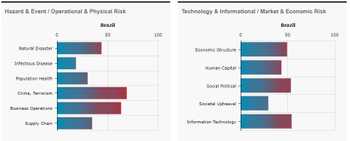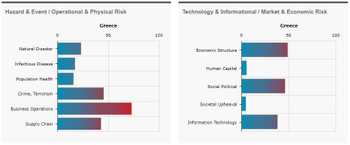If you are hosting a party, the last thing you want is a neighbor intruding and launching things over the fence, threatening to disrupt the festivities. And while that threat is certainly looming for South Korea as they prepare to host the 2018 Winter Olympics in February near the border with North Korea, Pinkerton Director David Rotger says that South Korea’s security will be the highest quality and the upcoming Games should be business as usual.
South Korea is not Brazil or Greece
Prior to the 2016 Summer Olympics in Brazil, threats to the visiting public, athletes, and officials were reported for several years. Pinkerton issued many warnings through our daily Insights alert and posted about key threats to Olympic security in a blog post. The issues ranged from an underfunded police force to facilities not being completed on time to the Zika virus. “Perhaps more than any Olympic Games in recent history, the Rio Olympics were rife with security issues that had officials on high alert,” said Rotger. However, the Rio Games went off without incident and were deemed a success from a security standpoint.
Similarly, the 2004 Summer Olympics held in Greece were beset with security issues leading up to the Games. CBS News went as far as to proclaim “Athens Olympic Security a Mess” less than a year prior to their start. The threats stemmed from dilapidated infrastructure, under-trained security staff and disorganization.
But according to Rotger, none of those issues are present for the 2018 South Korea Winter Olympics. “Pyeongchang is a modern city in a country that is very advanced,” says Rotger. “They don’t have the uphill battle that Greece or Brazil had where major work had to be done just to bring systems up to modern levels of functionality. Besides the normal threats of hosting a major event, South Korea doesn’t have the additional burdens other host regions have had.”
Pinkerton’s Risk Index verifies Rotger’s claim. Developed in 2016 with an update releasing this fall, the Pinkerton Risk Index measures the potential risk to business continuity and operations for regions/countries throughout the world based on Pinkerton Risk Wheel. In the chart below, you can see risks in South Korea are low:

Compare that chart to that of Brazil:

And Greece:

And for comparison, here is the chart for the United States (which will host the 2028 Summer Olympics in Los Angeles):

There is one risk area in South Korea, however, that stands out as being higher than the others for the country: Social Political risk. And for that, they likely can blame their neighbor to the north.
North Korea could threaten Olympic security… but unlikely
“There is, of course, the elephant in the room and that is North Korea,” says Rotger. “The international community, business leaders, and security officials simply can’t predict what that country may do, if anything, to disrupt the Games. It’s a variable that has to be considered.”
Early on, there seemed to be some indication the North Korea would welcome the Games. As recently as June this year, a co-hosting scenario where select events would take place at North Korean venues was still being considered, though the idea was scrapped due to lack of time to prepare.
Yet ever since the Games were awarded to South Korea, media reports have been warning that the political and military stance of North Korea could threaten the Games. Last week, North Korea tested a missile by firing it over the north end of Japan.
Recent messages from North Korea President Kim Jong Un and United States President Donald Trump, communicated through press conferences, official statements, and Twitter posts, have escalated the concern.
The North Korean threat cannot be dismissed. However, these Olympics are similar to other events where terrorism, whether state sponsored or not, is a possibility. The greater likelihood for risk comes from more mundane and predictable sources.
“Typical” risks will come with South Korean Olympics
“What we will likely see in Pyeongchang are the typical risks that come with most big events” Rotger explains. “Top among them will be logistics. The host city is more than two-hours from Seoul, where most people will arrive.” The distance, he says, will create challenges for companies sending dozens of representatives to the Games.
“Keeping track of where everyone is will be difficult since roads will be very crowded and alternate routes will be used.” Rotger also notes that finding places for people to stay, if not done already, will be very difficult. “Companies may have people spread out over a large geographic area, increasing the risk since security measures will be stretched.”
Ginger Happe, another Pinkerton Director who has overseen security for many large-scale events, says that it will be important for companies to have a well-constructed contingency plan should something disrupt the Games.
“Companies need to start planning now for what their people will do should disaster strike,” she says. “How will you communicate with all your representatives? How will you get them out of danger areas or out of the country if needed? How will family members be alerted about the status?”
Rotger agrees, noting that while the risk of a large-scale terror attack may be low, recent “lone wolf” incidents, like the one in Barcelona where a single driver plowed a truck into a crowded street, are always possible…and mostly unpreventable.“
People need to know that those events are our new reality. Officials do what they can to prevent them but they are nearly impossible to predict. It’s important that companies and individuals have a plan, especially for communication, if an incident occurs at the Winter Games.





